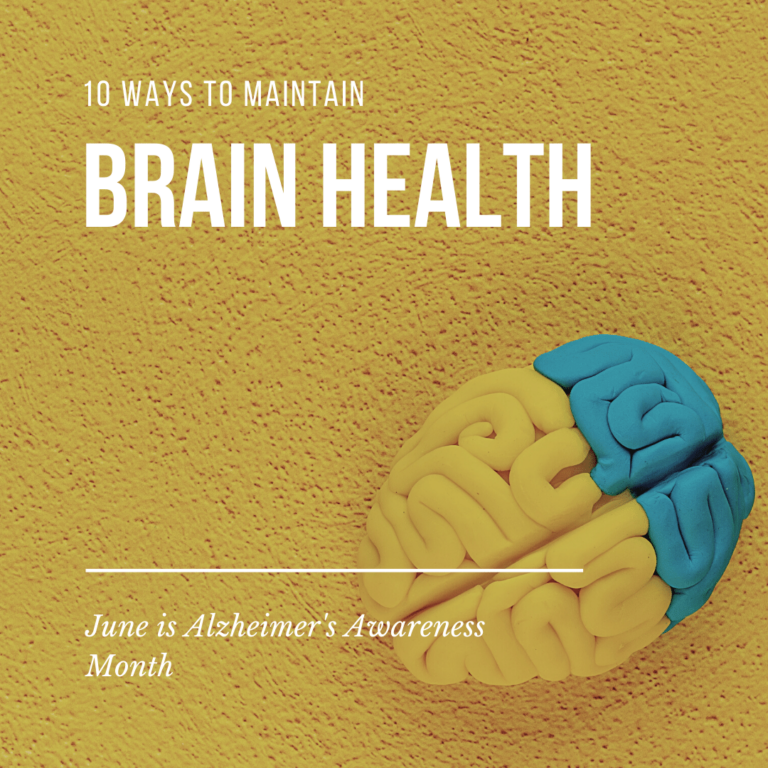Your brain is the most important organ in your body. It controls everything you do, from thinking and speaking to moving and breathing. That’s why it’s so important to take care of your brain health! In this blog post, we will discuss ten ways that you can maintain your brain health. Follow these tips and you’ll be on the road to a healthy brain!
Be Mentally Active
Mentally active people are less likely to develop dementia and other cognitive problems. So, what counts as mental activity? Anything that gets you thinking and using your brain! Some examples include reading, doing crossword puzzles or Sudoku, playing games, putting together a jigsaw puzzle, playing cards, and learning new skills. Additionally, you should also minimize the amount of TV you watch since this does not stimulate your brain in the same way. It’s important to keep your mind active throughout your life – not just when you’re young.
Be Physically Active
Just like your body, your brain needs exercise to stay healthy. Physical activity increases blood flow to the brain and helps to reduce the risk of developing dementia and other cognitive problems. Not to mention, physical activity helps improve your overall health, which translates to better brain health. So get up and move! A moderate amount of physical activity is the key – too much or too little can be harmful. Ideally, you should aim to exercise several times a week for at least 30-60 minutes. Walking and swimming are two moderate aerobic activities that are good for increasing your heart rate.
Eat a Mediterranean Diet
The Mediterranean diet is rich in vegetables, fruits, whole grains, oily fish, and olive oil. It also has less salt and bad fats that are commonly found within the typical American diet. This type of diet has been linked with a lower risk of developing dementia and other cognitive problems. While the exact reason for this is still being researched, some researchers believe that this may be due to the omega fatty acids found in extra-virgin olive oil. So eat like a Mediterranean and your brain will thank you!
Get Enough Sleep
Sleep is important for both your physical and mental health. When you sleep, your brain is able to rest and repair itself. This helps to improve your cognitive function and reduces the risk of developing dementia and other cognitive problems. However, it is important to get 7-8 consecutive hours of sleep instead of fragmented sleep to get the most benefits of sleep. So make sure to get plenty of rest! If you are struggling to fall or stay asleep, be sure to discuss your concerns with your doctor to determine the cause.

Manage Your Overall Health
Blood sugar, cholesterol, and blood pressure levels can all affect the health of your brain, as well as the rest of your body. In fact, high levels of sugar, cholesterol, and blood pressure have all been linked with an increased risk of developing dementia and other cognitive problems. So it’s important to keep these levels in check! You can do this by eating a healthy diet, getting regular exercise, and avoiding tobacco and alcohol. In some cases, you may also need to speak with your doctor about medications to help regulate these levels.
Avoid Tobacco/Alcohol
Tobacco and alcohol have both been linked with an increased risk of developing dementia and other cognitive problems. They also increase your risk of developing a range of other health problems. So it’s best to avoid them if you can. When it comes to smoking, the best option is to quit. When it comes to alcohol use, it is recommended to limit your use to two drinks per day.
Manage Your Mental Health
Your mental health is an important aspect of brain health. Mental health problems like depression and anxiety have been linked with an increased risk of developing dementia and other cognitive problems. So it’s important to manage your mental health! This can be done by getting regular exercise, eating a healthy diet, and getting plenty of sleep. In some cases, you may also benefit from working with a psychologist and/or taking medications to manage your symptoms.

Protect Your Head
Head injuries have been linked with an increased risk of developing dementia and other cognitive problems, even if they do not result in a concussion. So it’s important to protect your head and minimize your risk of head injuries. This can be done by wearing a seatbelt when you’re in a car, taking steps to avoid falls, wearing a helmet when you’re riding a bike, and avoiding contact sports.
Stay Social
Social interaction is important for your mental health, as well as your brain health. Research shows that having strong social ties can help to reduce the risk of developing dementia and other cognitive problems. Social relationships help practice your “transactive memory” and help prevent depression. So make sure to stay social! This can be done by spending time with friends and family, joining a club or organization, or volunteering in your community.
Go Back to School
Formal education is another great way to keep your brain in tip-top shape. Research shows that people with more formal education have a lower risk of developing dementia and other cognitive problems. Formal education can also help improve your memory, problem-solving skills, and critical thinking skills. So if you haven’t already, consider going back to school! Even taking a class through your community can be enough to exercise your brain.
In Conclusion
In this blog, we discussed ten tips to maintain brain health. All of these tips are important for maintaining a healthy brain. Be sure to implement these tips into your daily life to help reduce your risk of developing dementia and other cognitive problems.
We hope you found this blog post helpful! If you have any questions or would like more information, please feel free to contact us. Thanks for reading!

Dr. Kashouty, a diplomate of the American Board of Psychiatry and Neurology (ABPN), practices general neurology with fellowship trained specialization in clinical neurophysiology. Dr. Kashouty finds the form and function of the nerves and muscles the most interesting part of neurology, which is what led him to specialize in neurophysiology with more emphasis on neuromuscular conditions. He treats all neurological diseases, but his main focus is to treat and manage headaches, movement disorders and neuromuscular diseases.




